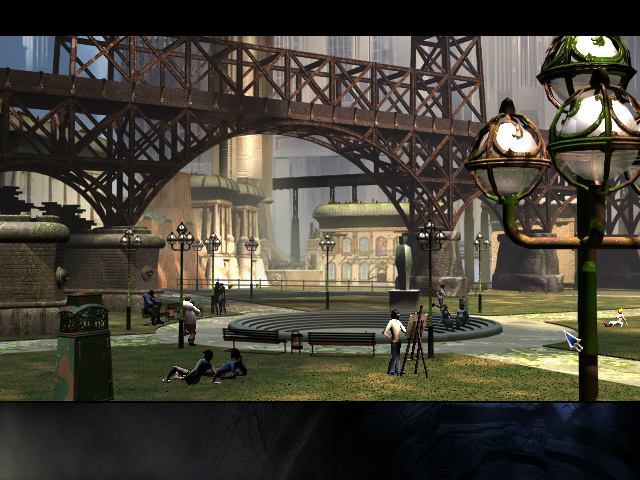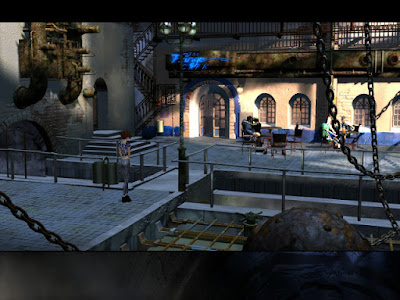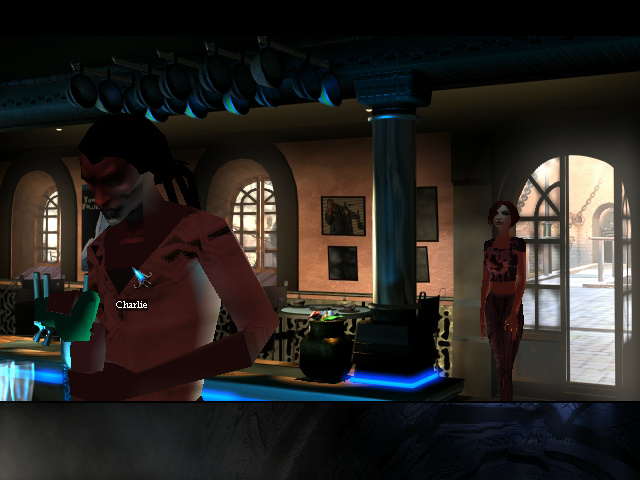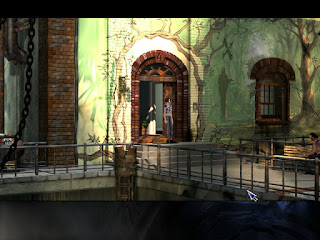Point-and-click adventure games are a genre that I never really sunk my teeth into. Growing up, the only game of that I ever went out and got was King's Quest VI. I think it was partly that the family computer wasn't all that great, thus limiting the selection of games that could actually run on it, and also in part due to how wholeheartedly I embraced RPGs at the time. As such, adventure games fell by the wayside.
In recent years, I've found myself wanting to actually spend some time with the genre, so I've decided to fire up The Longest Journey (TLJ). It certainly has a good reputation and seemed like as reasonable of a starting point as any for venturing into this area of gaming that I've neglected until now. At this point, I've just finished up the first chapter, so will be focusing on the events up to there. Hopefully I'll be able to make it to the end of the game. It's had the occasional time where it has completely frozen my computer, forcing me to alt-tab and restart. It hasn't happened often, but it is a thing, so fingers crossed it doesn't get too obnoxious and prevent me from finishing TLJ.
One thing that struck me while wander the streets of Venice (I'm guessing it's supposed to be in California) was how the game juxtaposes vastly different world. We start out with the main character, April, having a dream where she's on a cliff in some strange realm with unusual mountains off in the distance. Before long she's having a conversation with a tree, then meets a talking dragon. It's all very surreal, and more than a little prophetic. Suddenly, she wakes up to find herself in the boarding house where she lives, and we learn that April is a college art student with an important assignment due soon. She's a bit bothered by the dream and the fact she's been having a lot of odd ones lately, but shakes it off as she needs to get cracking on that project. It's all very typical fair. The sort of thing any college student will have to do. She went from talking with dragons to plain ol' reality. However, when walking to the art academy players are shown a cut scene of impossibly huge buildings jutting into the sky and flying cars. Now, April's simple college life doesn't seem so mundane anymore. She lives in the future.
 |
| A trip to the park. |
With that, we can see that the game is actually balancing two very different worlds that tend to inhabit opposite ends of the fiction spectrum. This in and of itself has peaked my interest, as I am quite curious how this will play out. All the while, we have April and her friends keeping things grounded with their day-to-day goings ons. While talking dragons and flying cars aren't exactly relateable on a personal level, college life certainly is. Walking around, learning more about April and her friends, on more than a few occasions I found myself thinking, "Yeah, I remember someone like that back when I was in school." Even Cortez. I dunno, maybe that was just something from the 90s, invariably meeting an old, burned out hippy in college.
Actually getting to know all of the characters and learn a bit about April's background has felt somewhat awkward, though. Just walking around and striking up conversations with people, they'll go into a bit of a back and forth with the usual niceties, maybe giving a hint of some of what's going on in the world while they're at it. Once this is done, players get a number of conversation options, many of them questions. I understand that from a gameplay perspective this is meant as a sort of data dump. It's there to help us understand the world we're in and the people in April's circle of friends. Nonetheless, the sheer volume of questions comes off as a bit unnatural. If one of my friends came up to me asking all sorts of questions about myself, our friends, and themselves, I'd be a little weirded out. When did they become Hercule Poirot? In the end, it's something that I can let slide, but as I went from Fiona, to Charlie, and finally to Emma, it did feel a little strange grilling them so much. They didn't mind, though, and humoured April with her questions.
 |
| Heading to the cafe to meet Emma. |
Between going to school to get April's assignment done, popping by the cafe where she works so she can pick up her pay, and playing cat and mouse trying to track down Cortez in hopes that he can explain what's going on, I got to see a fair amount of the city. It was during this time that it really became noticeable just how much effort goes into each location in an adventure game. Plodding through action games or an RPG there are, of course, moments when the player comes upon an area that really stands out. Maybe it's a castle, or an idyllic garden, maybe some hidden star system with gas clouds and colourful moons everywhere, whatever the case it's something that is impressive to have come upon. That being said, one usually has to travel through some relatively uninteresting areas before they get there for the big payoff. By comparison, adventure games feel like one area after the next of big payoffs, or, in the very least, less filler. A lot of thought goes into each location, making good use of every square inch of the screen. There tends to be a lot more little details tucked away everywhere, some of it functional, and some of it purely aesthetic.
While admiring these places, it got me thinking that for being in the future, Venice feels surprisingly contemporary in a lot of ways from what I've seen of the place so far. There are a lot of brick buildings, a park not unlike something I'd expect to see around where I live, a cozy cafe like something that might be tucked away on a Parisienne side street, and even the art school looks as though it could have been constructed in the mid 20th century. The major difference is the sheer amount of metal everywhere: girders, pipes, valves, and the like. It's obviously not our era, but at the same time it doesn't feel terribly removed from it. Inside the buildings as well, furnishings and interior design is more akin to something of our own time, doing away with futuristic tropes of what homes a few hundred years from now might look like. Again, it feels as though the environments are acting like an anchor to a reality that the player is far more familiar with, while the fantastic and the futurist hover at the peripheries. There are hints of these worlds, be it April's occasional hallucinations, or subtle pepperings of advanced technology throughout the neighborhood, but it has all been very subtle up until now.
 |
| Talking with Charlie at the cafe. |
Granted, Venice does seem like a bit of a rundown part of town and from what I've been told, it may be a home to the downtrodden with the homeless and starving artists comprising a large proportion of the town's population. All of that being said, one thing that caught my attention is the hints of the socio-economic situation in the game world. It goes for a more corporatist view of the future where huge conglomerates are highly influential and a permanent fixture in people's minds. This isn't anything new. Plenty of films and books have made similarly cynical predictions as to the direction our society might go in. What stood out to me about this is that Venice wasn't the dark, neon-lit, crime-ridden stereotype that often gets presented in these sorts of stories. The city is still a little dingy as rusted metal structures mingling with the brick buildings, and the polluted canals are pretty disgusting, but on the whole, Venice feels far more bright and hopeful. Maybe it's the youthful vigor of all the young artists there bringing life to their surroundings, but whatever it is there's much more of an easygoing, almost optimistic ambience to the town. I really appreciate this as things can often veer hard and fast toward the realm of cyberpunk when we're talking about a future where corporations are running the show. That's not to say I have anything against cyberpunk, but it's an intriguing choice to try and sidestep some of its tropes while maintaining such a socio-economic setup.
At this point, despite exploring the city, I feel like I've barely dipped my toe in TLJ. April still has a lot of questions that need answering, and I have a feeling that it's only a matter of time before we see more of this fantasy realm that has been haunting her. For now, though, it's off to talk with Cortez again. He seems to know something. Now, if only he'd be a little bit less cryptic about what he's getting at.
The Longest Journey Playthrough Index:
Part One - Talking Dragons and Burned Out Hippies
Part Two - From Arcadia to Police HQ
